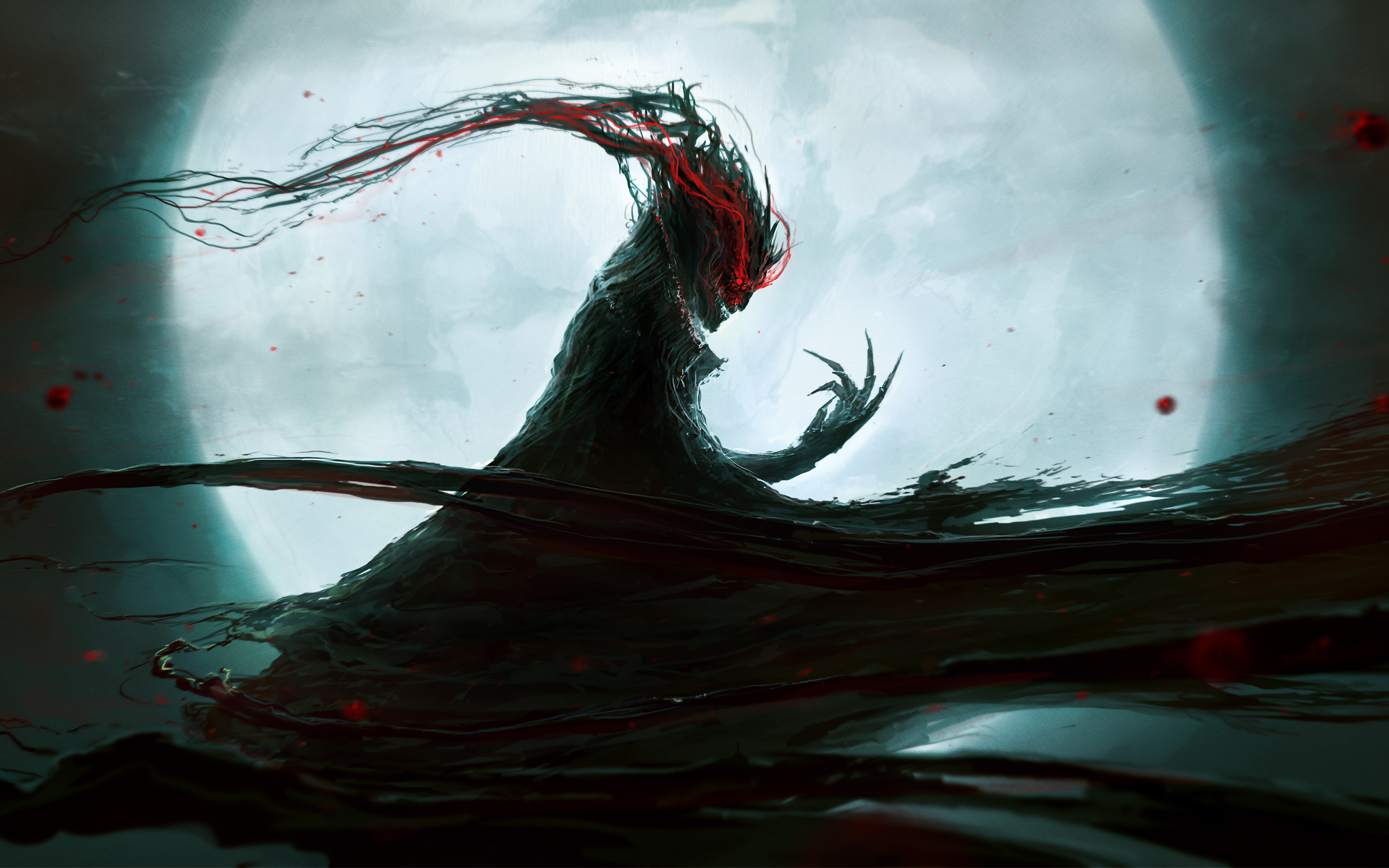Slaves of Hell
Few specifics are known to the occult world as a whole about those that serve demons. Some paint them as deluded fools who were trapped or corroded when they sought to master something that was not meant to be mastered. Others portray those that serve demons as pathetic, weak-willed souls who called up something they could not control. Some of these views are true, some false, and some are both. What is certain is that demonic servants, called thralls, are slaves to inhuman masters with unwholesome plans.

Why Serve?
Some slaves will choose to become a thrall in the mistaken belief that the demon will not take their souls, or will offer servitude as a way to extend their life spans. Others offer themselves up gladly in return for the power they expect they will receive. Others will choose to trade themselves in order to save someone else, or servitude may be something that is arranged contractually. For every power-seeking, vainglorious megalomaniac there are two people who thought they were making the best out of a bad situation. For every deluded fool trapped by chains of their own making, is a desperate soul trying to save someone. The reasons for servitude are countless.
The Price of Power
Demonic thralls have their very souls reshaped by the demon and receive from the demon up to 3 Seals, which the demon uses to grant its thrall supernatural powers and abilities. The thrall’s bond with the demon permits the demon to draw power, life force, and energy from the thrall, siphoning the living soul contained within its slave in order to expand its own powers and capabilities.
Each of these Seals not only requires that the potential thrall undergo some sort of ritual - a revelation which shatters or breaks the thrall's soul in such a way that it can then receive the infusion of demonic power granted by the Seals without shattering - but also requires the thrall to surrender some part of themselves to the demon in order to pay for the infusion. The thrall must surrender their Mind, Body or their Soul. The order in which these things must be surrendered is up to the demon offering the seals, but the price that must be paid is a requirement.
- When a thrall surrenders their Mind, they are no longer capable of refusing to obey the demon’s commands. They must obey the letter of the demon's will and cannot refuse to do so. Some of the strongest willed thralls can delay acting on their master’s commands, but they will act eventually, and every minute they spend refusing to do what their Master commands inflicts pain. A thrall who has surrendered their Mind gains immunity to mind control abilities and powers which influence or displace the mind. They cannot be possessed by anyone or anything.
- When a thrall surrenders their Body, their flesh is no longer their own. The demon can manipulate the thrall’s body, inducing emotions through biochemistry, influencing lusts and desires, or instilling delicious quantities of pleasure or agonizing forms of pain. A thrall who has surrendered its Body to a demon gains immunity to powers which manipulate the body or emotions.
- When a thrall surrenders their Soul, they grant the demon access to their soul, and agree that upon death the soul will belong to the demon personally. This gives the demon better control over his thrall, access to more of the power inherent to its thrall’s soul, and creates a psychic tether between the two. The demon will always know where its thrall is and in a case of an emergency, can use this psychic tether to possess the thrall, regardless of any immunity gained from surrendering the mind. A thrall which has surrendered their soul is harder to affect with magic and more likely to shrug off magical effects entirely.

Supernatural Thralls
Some demons have the power to bind supernatural creatures as their thralls, while others have the power to create some types of supernatural creatures out of regular human beings. When a demon does take a supernatural thrall, the prices are the same, but the power gained by the demon becomes linked to the powers of that creature: a vampire has more power than a human, and a demonic thrall is more powerful yet. Supernatural thralls can receive the same Seals that regular thralls can and enjoy the same benefits and penalties of the seals.
Covens
Covens are groups of sorcerers, which have historically been known as Witches, who have chosen to pledge their lives and souls to a demon in order to gain access to magical powers and capacities. Unlike other magicians and witches, sorcerers do not gain any real comprehension over the powers they wield, and their abilities do not increase with study or practice. In order to gain access to these powers, Coven-members pledge their obedience, lives, and souls, to the demon who is their infernal instructor.
Cabals
Sometimes demons can become the patrons for larger organizations, when they do this, the organization is referred to as a Cabal. In the modern world there are several fraternities across the United States and in Europe and Asia that are patronized by several powerful demons as well as a nearly endless chain of Companies, Churches, and other groups which enjoy demonic patronage. To create a Cabal, the leaders of a group and a demon come together in a process which is similar to a Crossroads deal. The leaders of the organization submit their desires for their organization and the demon agrees to grant those desires. In return, the demon receives the souls of the leaders and every member of the Cabal in perpituity. Using the souls of the leaders, the Demon reshapes the world exactly as a Crossroads Demon does, and the organization enjoy the benefits it bargained for. The demons gets the souls of all of its members, AND access to the groups resources and capabilities.
Attitudes towards thralls
Most demons view their thralls as disposable assets, useful and perhaps viewed fondly in the same way that humans view their pets, but ultimately disposable and replaceable. Some maintain relationships with their thralls that are deeper than mere Master and slave, demonstrating loyalty to their thrall as either a matter expediency or to foster good working relationships.


